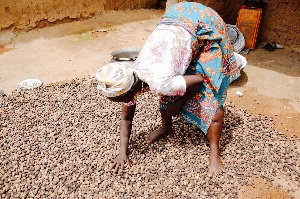Business News of Thursday, 8 May 2025
Source: www.ghanawebbers.com
Editorial: Drought conditions in savannah belt threatening shea production
Ghana produces over 150,000 metric tonnes of shea nuts each year. However, only 30-40 percent is processed into shea butter domestically. The remaining nuts are exported raw, mainly to Europe for refining.
In 2020, the COVID-19 pandemic caused a slight drop in exports. Ghana exported only 75,000 metric tonnes worth US$70 million that year. In 2021, exports increased again to 85,000 metric tonnes valued at US$80 million. By 2022, over 90,000 metric tonnes of sheanuts and shea butter were exported for about US$90 million.
The Ghana Shea Employers Association (GSEA) is calling for an immediate ban on raw shea nut exports. They cite threats to local processors and the economy in northern regions. The association highlights negative impacts on pickers and local businesses, many of which are women-led.
They urge foreign investors to establish processing factories in Ghana. This would promote job creation and boost domestic revenue. Sheanuts are a key non-traditional agricultural export that can improve rural women's incomes in northern Ghana.
Erratic rain patterns have led to intermittent droughts affecting farmers reliant on seasonal rainfall. Climate change impacts food crops and deep-rooted trees alike due to rising temperatures.
Environmental degradation from unregulated harvesting threatens biodiversity as well. Deforestation, bushfires, logging for firewood, and large-scale agriculture are accelerating climate change effects on shea tree farms.











